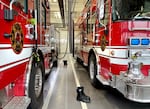Portland Fire Bureau crews will start treating people for opiate addiction immediately after they’re revived from an overdose, using medications at the scene that are typically first administered at medical facilities. According to the city, the mobile medication pilot program will also connect people to longer-term recovery and treatment services.
It’s a novel approach public safety leaders hope will help save lives amid a flood of illicit fentanyl, the latest phase of an opiate epidemic that’s surged across the country.
Currently, there’s nothing like it in Portland, though it’s something that’s been tested in communities across the country. After being revived from an overdose, people are in immediate withdrawal and feel sick. That deeply uncomfortable sensation can make it difficult for people who use drugs such as illicit fentanyl to navigate much beyond a desire to feel better. And it can be a barrier to a decision to access treatment. Health leaders also note the realities of immediate withdrawal puts people at a heightened risk of returning to drug use as they look to ease withdrawal symptoms.
This latest effort in Portland potentially offers another option for someone to move beyond the immediate discomfort and process whether they’re going to access long-term treatment.

Trucks at the ready at Portland Fire & Rescue, Station 1 on Nov. 30, 2023. PF&R has 31 stations, delivering services throughout the city of Portland.
Kristyna Wentz-Graff / OPB
Overdose deaths in Oregon shot up from 701 in 2020 to 1,288 in 2022, according to data published by the Centers for Disease Control and Prevention.
The Medication for Opioid Use Disorder Program, as it’s known, is a pilot funded through a $389,000 grant from CareOregon, a nonprofit that provides health insurance through Medicaid among other services. The mobile program will be operated by Portland Fire & Rescue’s Community Health Assess and Treat team, which responds to low-level medical emergency calls.
The Portland City Council voted 5-0 on Wednesday to accept the grant funds that will jumpstart the test project.
Drugs such as buprenorphine, which can be administered orally, are used to treat opiate addiction by reducing cravings.
Overdoses can be reversed using drugs such as Narcan. Narcan saves lives, but its use also means people emerge from a near-death experience immediately in withdrawal.
“It’s a very difficult and painful thing to go through,” Holly Ilg, a nurse with Portland Fire, told city commissioners Wednesday. “What we want to do is provide the buprenorphine, there on scene at the 911 call to help with the withdrawal symptoms so then we can get them to services.”
Ilg said patients who consent to the medication will be transported to a clinic operated by the nonprofit Central City Concern by cab or bus. The Fire Bureau’s Community Health Assess and Treat team members who gave the medication will meet the patient at the clinic to help them get checked in or administer more medication, if necessary. (Portland Fire’s community health division is not allowed to use their vehicles to transport people, Ilg said.)
The inability to access medication-assisted treatment is one of the main barriers that prevents people from trying it, Ilg said. At the same time, she explained, people who have a nonfatal overdose are 13 times more likely to die, compared to the general population.
“The greatest risk of death is in the first 48 hours after a Narcan administration,” Ilg said. “That’s why it’s so important for us to be there on scene after Narcan administration to offer a medication that can help … them get through that first withdrawal phase so they don’t go and seek another high in order to deal with those withdrawal symptoms.”
A 2022 study based out of Camden, New Jersey found when emergency responders equipped with buprenorphine responded to overdoses, those patients were six times more likely to engage in opioid use disorder treatment within 30 days. The study published in the Annals of Emergency Medicine also notes that people who get buprenorphine immediately after an overdose are less likely to use emergency department resources. But buprenorphine-equipped ambulances did not significantly decrease repeat overdoses “in either the immediate 24 hours or 7 days,” according to the study. That’s not what researchers said they expected and called for further study.
“Expanded out-of-hospital treatment of opiate use disorder is a promising model for rapid access to buprenorphine after an overdose in a patient population that often has limited contact with the health care system,” researchers wrote.
Portland Commissioner Rene Gonzalez, who oversees the city’s Fire and Rescue Bureau, acknowledged the program won’t solve the addiction crisis, but said it’s one more step that could help.
“It is literally taking first responders, connecting them into a system and a pathway towards recovery,” Gonzalez said. “But we’ve got a lot of people hurting, and the solutions are going to have to be comprehensive.”
Local health officials say they’re not sure yet how many people they’ll be able to treat, but the grant funding runs through June 2025 and a single dose of oral buprenorphine costs about $1. A team made up of a nurse, paramedic, community health worker and peer support specialist will have “daily contact by phone” or in person and will also do a 90-day follow up with patients.
“Opioid use disorder is not a moral failing,” Ilg said. “It is a chronic illness and most chronic illnesses require medication.”
OPB’s Alex Zielinski contributed reporting.
